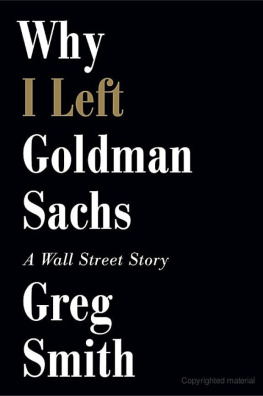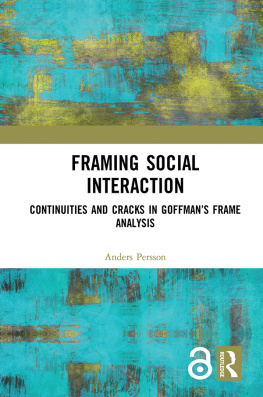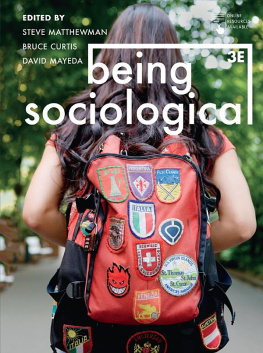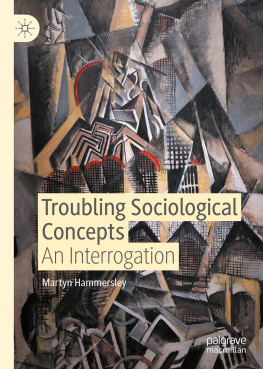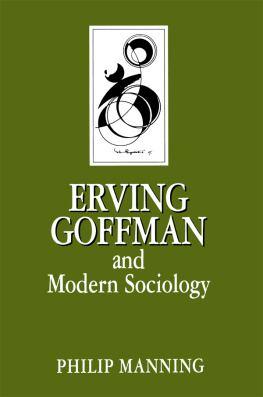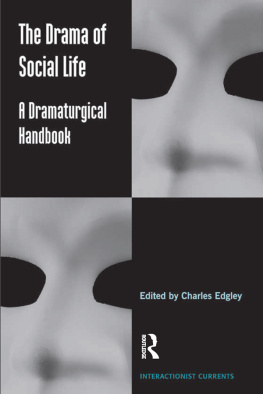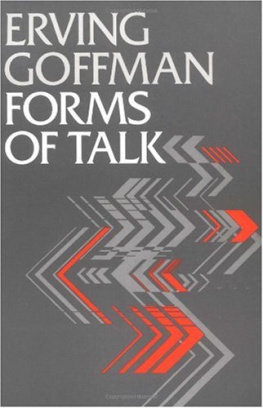Goffman and Social Organization
Erving Goffman is considered by many to have been one of the most important sociologists of the post-war era. His close observation of everyday life and his concern with the ways in which people conduct themselves in face-to-face situations led to his pioneering exploration of a new sociological domain, the interaction order. Many of his works in this area are now considered sociological classics, including Asylums, Gender Advertisements, The Presentation of the Self in Everyday Life and Stigma. This collection brings together internationally known sociologists to pursue and build upon diverse aspects of Goffmans legacy.
The contributors present chapters on key issues in Goffmans work, including:
- the bearing of Goffmans life on his work
- his sociologies of self, public places and mental illness
- Goffmans relationship to ethnomethodology
- the singularity of Goffmans ethnography and
- the part played by critical social enquiry and creative literature in shaping Goffmans highly distinctive sociological practice.
This collection reveals the richness of Goffmans writings and his contribution to sociology today. It will be essential reading for a wide range of academics, researchers and students whose own work involves understanding and using Goffmans ideas.
Greg Smith is Senior Lecturer in Sociology at the University of Salford.
Routledge Studies in Social and Political Thought
- Hayek and After
Hayekian liberalism as a research programme
Jeremy Sheamur
- Conflicts in Social Science
Edited by Anton van Harskamp
- Political Thought of Andre Gorz
Adrian Little
- Corruption, Capitalism and Democracy
John Girbng
- Freedom and Culture in Western Society
Haru Blokland
- Freedom in Economics
New perspectives in normative analysis
Edited by Jean-Francois Laslier, Mure Fleurbaey, Nicolas Gravel and Alain Trannoy
- Against Politics
On government, and order
Anthony de jasay
- Max Weber and Michel Foucault
Parallel life works
Arpad Szakokzai
- The Political Economy of Civil Society and Human Rights
G.B. Madison
- On Durkheims Elementary Forms
Edited by W. Pickering,
W. Watts Miller and NJ. Allen
- Classical Individualism
The supreme importance of each human being
Tibor R. Machan
- The Age of Reasons
Quixotism, sentimentalism and political economy in eighteenth-century Britain
Wendy Motooka
- Individualism in Modem Thought
From Adam Smith to Hayek
Lorenzo infannno
- Property and Power in Social Theory
A study in intellectual rivalry
Dick Pels
- Wittgenstein and the Idea of a Critical Social Theory
Giddens, Haberman and Bhaskat
Nigel Pleasants
- Marxism and Human Nature
Sean sayers
Goffman and Social Organization
Studies in a sociological legacy
Edited by Greg Smith
London and New York
First published 1999
by Routledge
11 New Fetter Lane, London EC4P 4EE
This edition published in the Taylor & Francis e-Library, 2002.
Simultaneously published in the USA and Canada
by Routledge
29 West 35th Street, New York, NY 10001
1999 Selection and editorial material Greg Smith; individual chapters, the contributors
All rights reserved. No part of this book may be reprinted or reproduced or utilized in any form or by any electronic, mechanical, or other means, now known or hereafter invented, including photocopying and recording, or in any information storage or retrieval system, without permission in writing from the publishers.
British Library Cataloguing in Publication Data
A catalogue record for this book is available from the British Library
Library of Congress Cataloging in Publication Data
Goffman and social organization: studies in a sociologcial legacy/edited by Greg Smith.
p. cm.(Routledge studies in social and political thought; 17)
Includes bibliographical references and index.
1. Goffman, Erving. 2. Social structure. 3. Social interaction. 4. Social groups. 5. Social role. I. Smith, Greg, M.A. II. Series.
HM291.G57 1999
301dc21 9835792
CIP
ISBN 0-203-01900-8 Master e-book ISBN
ISBN 0-203-21298-3 (Adobe eReader Format)
ISBN 0-415-11204-4 (Print Edition)
Contributors
James J.Chriss is Associate Professor of Sociology and Head of the Social Sciences at Newman University, Wichita, USA.
Gary Alan Fine is Professor of Sociology at Northwestern University, Evanston, USA.
Carol Brooks Gardner is Associate Professor of Sociology, Womens Studies and American Studies at Indiana University, Indianapolis, USA.
William Gronfein is Associate Professor of Sociology at Indiana University, Indianapolis, USA.
Philip Manning is Associate Professor of Sociology at Cleveland State University, Cleveland, USA.
Wes Sharrock is Professor of Sociology at the University of Manchester, UK.
Greg Smith is Senior Lecturer in Sociology at the University of Salford, UK.
Andrew Travers is Research Fellow in the Department of Social Work, University of Exeter, UK.
Rod Watson is Reader in Sociology at the University of Manchester, UK.
Yves Winkin is Professor and Director of the Laboratoire dAnthropologie de la Communication at the Universit de Lige, Belgium.
1 Introduction
Interpreting Goffmans sociological legacy
Greg Smith
The sociological project
Few would doubt Erving Goffmans right to a place in twentieth-century sociologys pantheon. He was author of eleven books and some two dozen articles which, a decade and a half after his death in 1982, continue to fascinate readers both inside and outside the discipline of sociology. Always a controversial figure, it is not surprising that the many introductions, reviews and appreciations of his work do not tend towards consensus. Yet Goffman set out his project of exploring the social order of interaction clearly and unequivocally, and pursued it with singular resolve.
Sometime between 194951, in the course of doctoral research in a small crofting community in the Shetland Isles, Goffman devised the sociological project that was to be extended and deepened over the remainder of his career. His objective, from which he never deviated, was to describe and explain aspects of face-to-face interaction in a consistently sociological manner. Christening his chosen field the interaction order (in the final chapter of his University of Chicago Ph.D. dissertation; see Goffman 1953) Goffman felt that he had discovered universal empirical material that might yield general rules and conventions (Manning 1992). Curiously, Goffman did not use the term the interaction order for another thirty years, even though he had at least one occasion to comment upon the absence of a convenient label to describe his field of interest (see Goffman 1971:xi n.1). It is only in virtually the last paper which he knew would appear in print (the posthumously published Presidential Address to the American Sociological Association [Goffman 1983b]) that Goffman returns to the term and lends it his valedictory stamp of authority. The Addressbecause of illness not given in personis a fully focused statement of what Goffman saw as the enduring themes of his sociological work.


